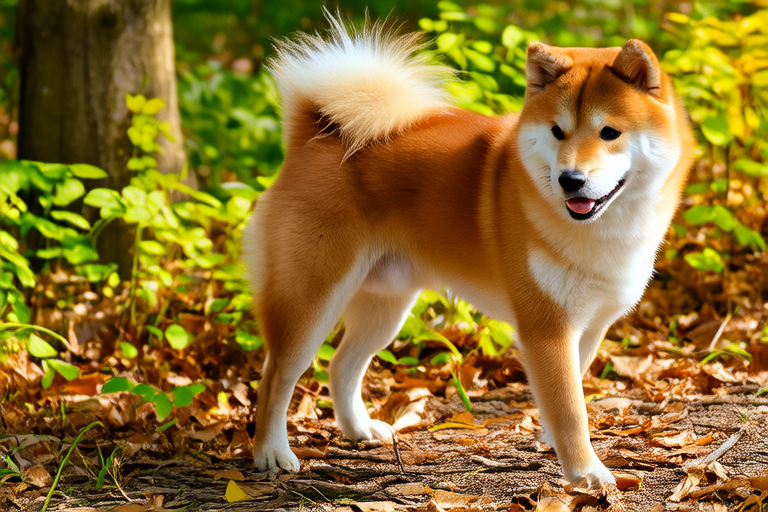The Unique Personality Traits and Qualities of Shiba Inus
Shiba Inus are more than just a popular breed of dog known for their striking red coats and fox-like appearance. They are also recognized for their distinct personality traits, intelligence, loyalty, adaptability, and rich historical background. This article delves into these aspects to provide a comprehensive understanding of what truly makes Shiba Inus exceptional companions.
Distinctive Personality Traits
One of the most notable characteristics of Shiba Inus is their independent nature. Unlike some breeds that are overly dependent on their owners, Shibas have a strong sense of self-reliance. This trait can be traced back to their origins as hunting dogs in Japan. They were used to track and flush out small game, requiring them to work independently while still being able to return to their handlers when necessary.
Dr. James Serpell, director of the Center for the Interaction of Animals and Society at the University of Pennsylvania, notes that “Shibas are intelligent but not always eager to please.” This independence means they can sometimes be stubborn or aloof, especially with strangers. However, this doesn’t mean they lack affection; it simply indicates that they form strong bonds with their immediate family members rather than everyone they meet.
Another defining feature of Shiba Inus is their alertness. Their keen senses make them excellent watchdogs. They are quick to notice any unusual activity around their home, whether it’s an unfamiliar noise or a person approaching. This vigilance combined with their natural wariness towards strangers helps protect their families effectively.
Intelligence and Trainability
Shiba Inus possess high levels of intelligence, which is essential for a breed originally bred for hunting purposes. Their intelligence manifests in various ways, including problem-solving skills and quick learning abilities. However, training a Shiba Inu requires patience and consistency due to their independent streak.
Veterinary behaviorist Dr. Karen Overall emphasizes the importance of positive reinforcement during training sessions. “Positive reinforcement works best because it builds trust between the owner and the dog,” she explains. “This approach encourages Shibas to associate good behaviors with rewards, making them more likely to repeat those actions.”
Despite their intelligence, Shibas can be challenging to train because they often question commands before obeying. This behavior stems from their history as free-roaming dogs who had to think critically about survival. Therefore, trainers must establish themselves as leaders while maintaining a gentle demeanor.
Loyalty and Bonding
While Shibas may appear aloof at first glance, they are deeply loyal animals once they form attachments. Their loyalty is evident in how they protect their families and homes. For instance, many owners report that their Shibas will bark loudly if someone approaches their property, even if the visitor is known to them.
One owner shared her experience: “My Shiba Inu, Kiko, has been my constant companion for years. She never leaves my side unless I tell her to, and she always comes running when I call her name. It’s like she knows exactly what I need without me having to say anything.”
Experts agree that Shibas form strong bonds with their primary caregivers. According to Dr. Ian Dunbar, founder of Sirius Dog Training, “Shibas are very attached to their owners and tend to follow them everywhere. This attachment creates a deep sense of security for both the dog and its human.”
Adaptability and Versatility
Shiba Inus are remarkably adaptable dogs capable of thriving in various environments, from urban apartments to rural homes. Their small size and low exercise requirements make them suitable for city living, while their resilience and agility allow them to excel outdoors.
One example of a Shiba Inu’s adaptability comes from a rescue story involving a pair of Shibas named Akira and Hana. After being abandoned by their previous owners, these two dogs found new homes in different parts of the country. Akira settled into life in a suburban neighborhood, enjoying daily walks and playtime with his new family. Meanwhile, Hana adapted well to rural life, exploring acres of land and participating in farm activities.
This versatility extends beyond just location; Shibas can also adjust to changes in routine. Whether it’s a sudden change in schedule or a move to a new house, Shibas tend to handle such transitions calmly and efficiently. Their ability to adapt makes them ideal pets for people with busy lifestyles or those who frequently travel.
Historical Background
The history of Shiba Inus dates back centuries in Japan. Originally bred as hunting dogs, Shibas were valued for their keen senses and agility. Over time, they became cherished household pets in Japanese culture.
During World War II, the breed nearly faced extinction due to bombings and diseases. However, dedicated breeders worked tirelessly to revive the population by crossbreeding remaining purebred Shibas with other similar-looking dogs. Today, Shibas remain one of the most beloved dog breeds in Japan.
In recent decades, Shibas have gained popularity worldwide, particularly in North America and Europe. Their unique appearance and temperament have attracted many admirers who appreciate the breed’s distinctive qualities.
Conclusion
Shiba Inus are much more than just aesthetically pleasing dogs. Their unique personality traits, intelligence, loyalty, adaptability, and rich historical background contribute significantly to why they make such exceptional companions. Understanding these aspects allows potential owners to better prepare themselves for life with a Shiba Inu and ensures a rewarding relationship between humans and their four-legged friends.
